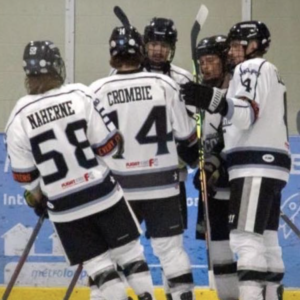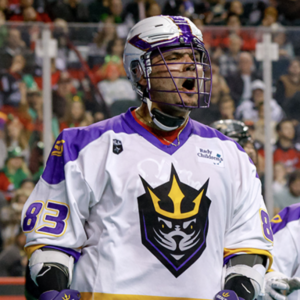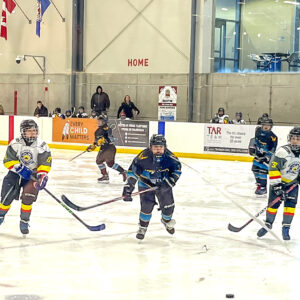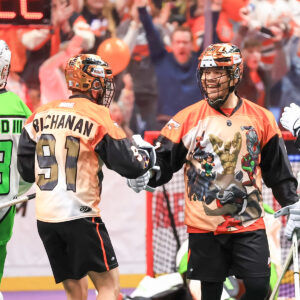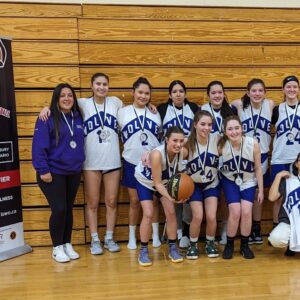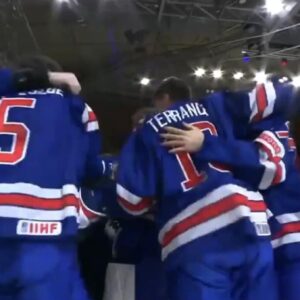
The General siblings are utilizing hockey to learn life lessons and to grow through travel, competition and opportunity.
When thinking about sports, the words that often come to mind are discipline and fitness, but those words only scratch the surface.
There is a lot that on-lookers don’t see in sports; including the countless hours each athlete spends at home in the backyard practicing on their own — simply because they love their sport. Even the values that aren’t apparent but are often taught through organized sports can only be described by those that have experienced and learned them first hand.
Sitting down with Shaun General and his younger sister Alissa General to talk shop about their sport, hockey, allowed both young athletes to give an in-depth look at how the sport has helped to shape both of their lives, and themselves.
S. General could remember starting to play hockey at the age of three or four and it has been a part of his life ever since.
“I just started playing backyard,” he said. “Then I went to a league in Hagersville and then made my way back into Ohsweken. But in my second year of bantam I moved up to play double ‘a’ in Brantford, then I went on to play triple ‘a’ in my first minor midget year.”
He now plays for the [49ers] junior ‘a’ and junior ‘b’ teams in Brantford, where he has taken on the responsibility of team captain.
“I had to grow into [the role] for sure, I’ve never been a captain in my whole life and it’s definitely a lot of responsibility,” he said.
Often, leadership roles on teams are not voted on, but are rather given by the coaching staff. As captain, S. General has since focused on maintaining the morale of his teammates, making sure each player is ready to work together and ensuring that the younger players moving into the league can make the transition. He does this by offering advice that comes from his own experience, and he will often tell some of his teammates not be “so hard on themselves,” because he’s been in their positions before.
Becoming a role model and subsequently a teacher to his teammates, was an opportunity he might not have otherwise had without hockey. After his coaches hinted at and later put him into the role, S. General explained that despite all of the responsibilities and effort required, it was welcomed.
“I wanted to come into the room and set an example and be a role model and I try to bring my best everyday,” he said. “[As for my goals], the sky is the limit.”
This led into the advice that he would offer to other young hockey players.
“Don’t be afraid to take risks,” he said. “I know a lot of kids are kind of afraid to move away from home and I would say that home is always going to be here, so don’t be scared to branch out and explore your opportunities.”
Along with visiting elementary schools in Brantford to read stories to young students and participating in skates with the W. Ross MacDonald School, S. General explained that the opportunities brought about by hockey have been abundant.
“[Through hockey] I got to meet a lot of inspirational people and I got to see a lot of stuff,” he said, as he mentioned that he played for a national indigenous hockey team in British Columbia two years ago.
“I feel like hockey teaches you a lot of stuff about life in general. You learn a lot; taking responsibility, routine, showing up on time is another big one. It just teaches a lot of simple stuff that can make you more successful in life.”
Outside of the arena, he enjoys video games, hunting, basketball, fishing, and going to the gym and noted that hockey has contributed to an active lifestyle. After graduating from Assumption College School in Brantford, he now has his sights set on Fanshawe College in London.
For A. General, she started skating when she was four.
“Then I started playing with the boys on Six Nations actually, when I was seven,” she said.
She hasn’t stopped since as she now plays for the Ancaster Avalanche, a top tier girls midget double ‘a’ hockey team. She has played on national teams including Team Ontario in Nova Scotia and most recently played in Winnipeg, but her goals reach even higher.
“Ever since I started playing hockey my goal was to be on the olympic team,” she said, noting that she looks up to Brigette Lacquette, the first female indigenous hockey player to play on Canada’s Olympic Women’s Hockey Team from the Cote First Nation in Saskatchewan.
During the ‘Hit the Ice” hockey camp, the best young female indigenous hockey players from Canada including A. General, came together for two-weeks and Lacquette was one of her coaches.
She was interviewed by APTN for Hit the Ice show series that will be aired sometime this summer.
“It was really cool and I got to meet girls from all across Canada,” she said.
But among the opportunities to travel and make friendships along the way, A. General explained that the sport itself gave her a real understanding of how to work for something.
“[I learned just] how much hard work I had to put in to be successful and to win. It’s not something that’s handed to you, you have to work for it,” she said, leading into her advice to other young girls looking to go somewhere with hockey.
“I’d say that for girls it’s a bit more difficult for you to get places,” she said. “You’ll run into bumps on the road, but just don’t give up on yourself and keep working hard and good things will come to you.”
A. General has visited Boston, Massachusetts, and Detroit, Michigan to play, but besides travelling and reaching the goals she has set for herself, she noted that hockey has helped her in another way that some might not realize.
“I was really shy,” she said. “And now that I’ve met all of these different girls and talked to different people, it’s made it easier for me to talk to anyone really. Even other coaches when they approach me. So it’s definitely helped me in that way.”
Being put in active social situations is listed as one of the top benefits of organized sports.
A. General enjoys other sports outside of hockey, and spends a lot of her free time with family and friends. She will be going to the North-West Territories with Team Ontario again this year, and looks forward to the future after she graduates St. Johns College: a high school in Brantford.
Both siblings are two of the only indigenous youth on their current teams.



